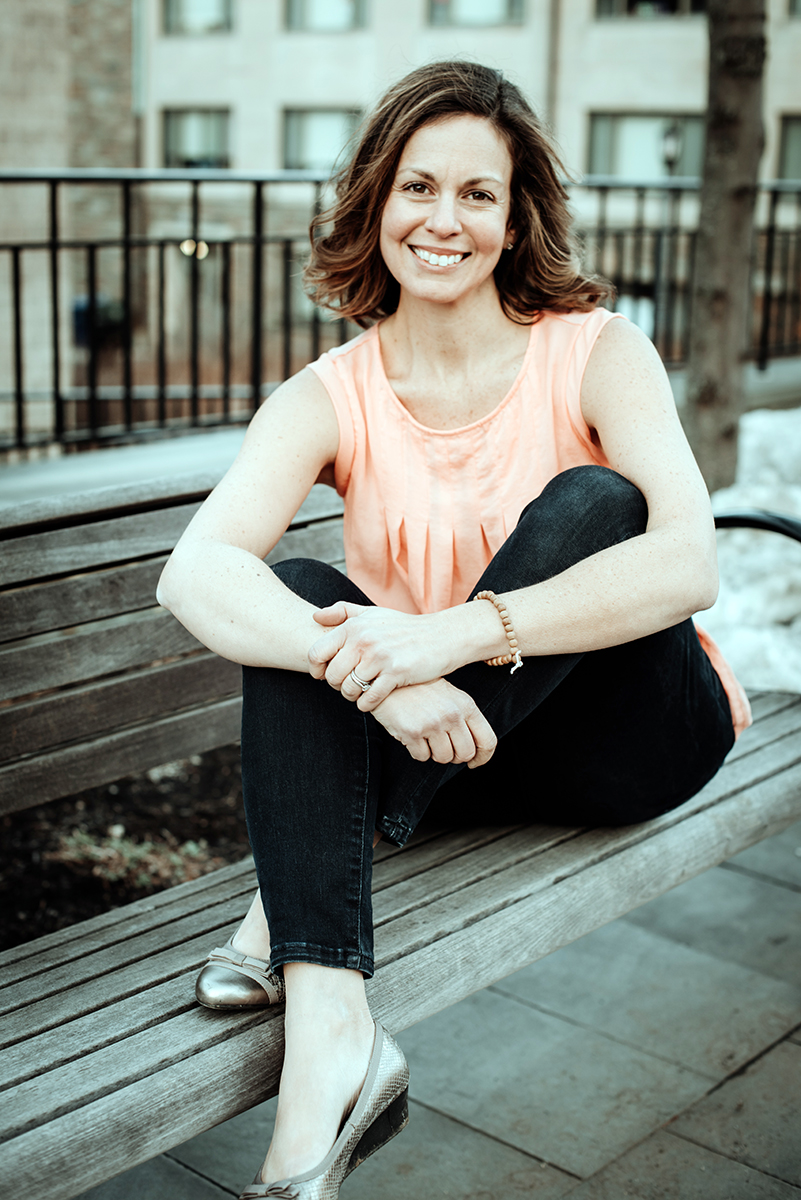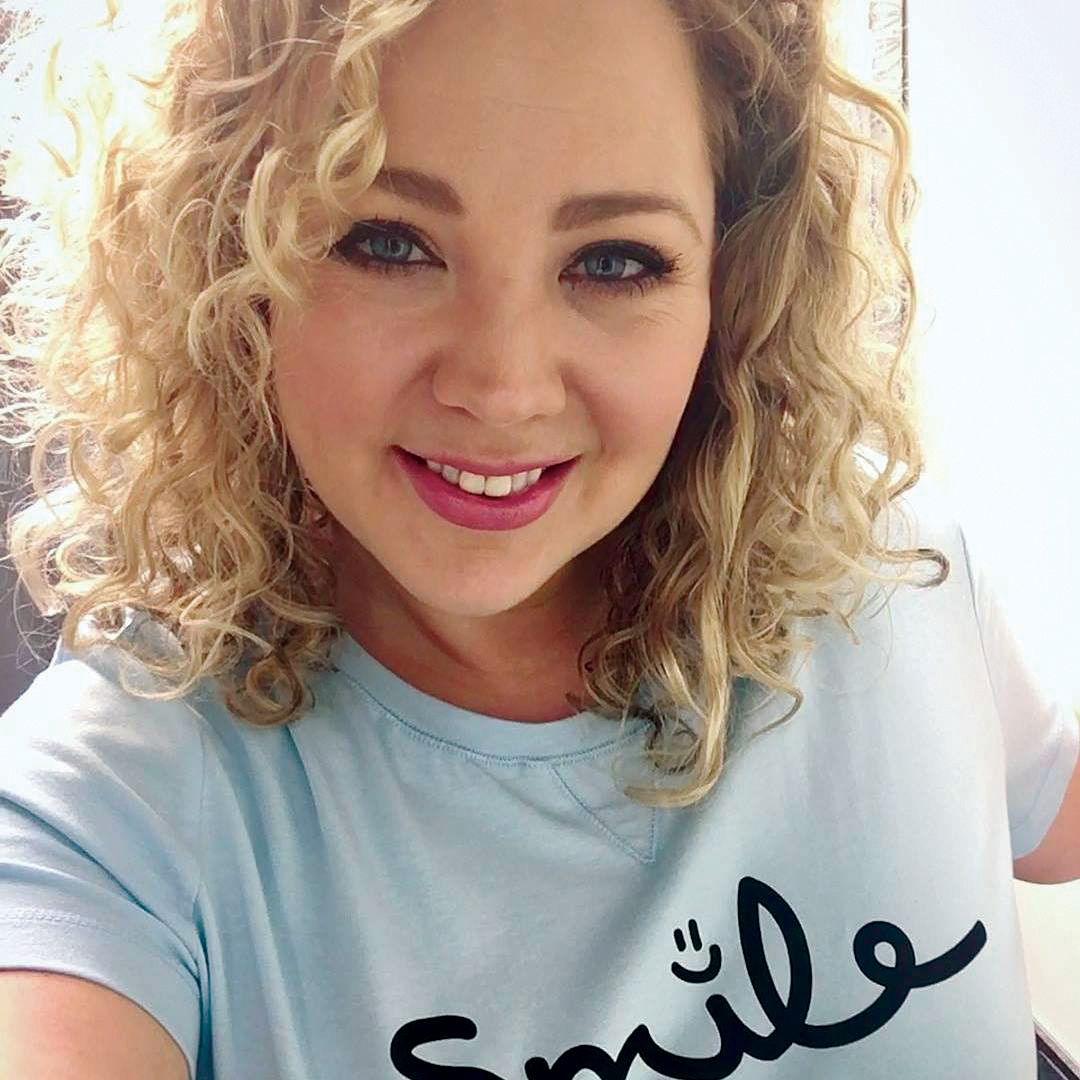As women, we get locked in complicated relationships with our bodies, born in what we learn from very young about what the female form should look like and cemented by the struggle to achieve and maintain that image. Appreciating our bodies will help us place value in who we are, not just how we look. This is where we begin.
On Mother’s Day 4 years ago, Jennifer Womer Kreatsoulas went for a walk in Wissahickon Park with her husband and their two daughters, who were 2 years old and 11 months at the time. It should’ve been a happy day.
The Elkins Park, Pa., mom was overwhelmed with gratitude for her two healthy babies and loving husband. Yet, she was also straight-up overwhelmed. The stress of being a new mother coupled with post-partum depression and no time for self-care had prompted Kreatsoulas to “flirt” with anorexia—a disease she fought years earlier while she was in college. Her over-exercising and disordered eating had made her so weak, she couldn’t even push her baby’s stroller.
“I had this very clear moment when I said to myself, This is not OK; This is not fair to my family. I will not be a chronically ill mother,” says Kreatsoulas, now 42. “The following day, I called the Renfrew Center in Philadelphia to have an assessment.” A few weeks later, she was admitted to their residential treatment center and stayed for a month. “It was so painful to leave my family,” she says. “Both of my daughters had birthdays while I was there. But I had to do the work.”
Like Kreatsoulas, many women who’ve fought anorexia at some point in their lives will relapse. In fact, one 2017 report published in the Journal of Eating Disorders found that more than 25 percent of patients will face the condition again. According to the National Eating Disorders Association, the birth of a child can spark the return to eating disordered behaviors. So, can other common stressors, such as moving, starting a new job, marriage or divorce, the death of a loved one, diagnosis of a chronic disease, and menopause.
“It’s important to acknowledge that eating disorder recovery is extraordinarily difficult work, and that the reality is that it can be easy to slip into old, familiar patterns of behavior,” says Dr. Ashley Solomon, executive clinical director of the Eating Recovery Center in Ohio. “Relapses can sneak up on someone.” Considering 30 million people in this country suffer from an eating disorder—including 13 percent of women over age 50—it happens more often than you might think. And even if you haven’t personally struggled with the disease, there’s a good chance you know someone who has.

“On those hard body image days, when self-love seems impossible, I encourage you to come back to another quality like kindness or compassion and start there. Ask yourself this: Rather than self-destruct, what’s one small act of kindness I can do for myself?”

Important Advice
Q As women, most of us face some sort of body image issue at some point in our lives. How can we tell if it’s that—or an eating disorder?
A “Body image concerns are, unfortunately, fairly normal in our culture. We live in a society that tells us that our bodies are wrong every day. So, some conflict about our appearance and bodies is to be expected. These become more problematic when they are persistent thoughts, and when those thoughts start to influence our behavior. Having a thought that you wish you had a different body shape is one thing; starting to fantasize or act on ways to alter your body shape is another. And if those fantasies of behaviors start to interfere with other aspects of your life—like your ability to focus, your interest in things you enjoyed doing, or the quality of your relationships—it’s a sign it may be a more significant problem.”
— Dr. Ashley Solomon, executive clinical director of the Eating Recovery Center in Ohio
Charting a New Path
The support Kreatsoulas received during her stay at Belmont was the first step toward her recovery—and she stayed well for a long while. When she went back to college for her junior year, she enlisted her friends to help hold her accountable to eating meals. Soon after she graduated, she started practicing yoga.
“Yoga solidified everything I had learned about myself when I was in treatment,” says Kreatsoulas. “It taught me to experience my body, which is so important for people suffering from eating disorders because our bodies become the thing we are trying to run from,” she adds. Kreatsoulas says yoga helped her heal some of the beliefs about herself that led to her eating disorder, and it also helped her let go of the expectations she placed on herself. She started to accept herself exactly where she was. “The yoga studio was an environment where love of self is talked about repetitively, and it made a huge difference.”
In fact, it made such a difference in Kreatsoulas’ healing journey that in 2002, she did her first 200-hour yoga teacher training and started teaching. She taught for 8 years—even through her PhD program and after she started a job as a medical writer. But when she had her first daughter in 2011, she stopped teaching and practicing yoga. By the time she had her second daughter in 2013, due to lack of energy, time, and motivation, she’d completely abandoned the practice that had helped her so much—and she started spiraling, quickly.
“One of the greatest gifts that came out of my anorexia relapse is the realization that in order for me to be well and maintain that wellness, I had to incorporate my passions back into my life,” says Kreatsoulas. “I had to learn how to make space for me again.” When she left treatment at the Renfrew Center in 2014, Kreatsoulas found a yoga therapy program at the YogaLife Institute in Wayne, Pa., and instantly knew she wanted to learn more about how she could help others heal by helping them learn to feel embodied. “I had all of these years of yoga and yoga teaching and I knew yoga therapy was a way that I could work with others, one on one, in a meaningful way,” she says. Kreatsoulas recently finished the Institute’s 3-year comprehensive yoga therapy program, and she’s now helping others like her with their eating disorder recoveries.
“I work with the practices and philosophies of yoga, like mantra, breathing, visualization, meditation and yoga poses to support people in their recovery goals and heal negative body image,” she says.
Kreatsoulas is so passionate about this work that she co-authored a book, out this November, called Body Mindful Yoga: Create A Powerful and Affirming Relationship With Your Body. It’s all about how we use and receive words—and how these words impact how we feel about ourselves. In writing this book, Kreatsoulas says she’s aiming to help as many people as possible see that no matter what their body image issues may be—and no matter how those issues show up, whether in the form of an eating disorder or self-smack talk—it’s important to look at them and take action. “We often think of body image issues and eating disorders as a teenage problem, and if they resurface in adulthood, we think we’re being ridiculous or self-centered if we talk about them again,” she says. “But as we get older, the stakes get higher, and these issues and diseases are as unpleasant to contend with now as they were back then.”
How to Help Yourself
It can be tempting to brush off body image issues or the hints of a relapse of disordered eating as no big deal. But the sooner you catch yourself, the better says Solomon. “Eating disorders can be insidious and deadly, and while many people think that sounds dramatic, the reality is that eating disorders have the highest mortality rate of any mental illness,” she says. “Falling into old, problematic symptoms is not benign. These symptoms go back to robbing you of your joy and can lead to some really devastating outcomes.”
If you can relate to any part of Kreatsoulas’ story, or know that you’re experiencing body image issues that you’d like to change, she offers the following tips to help you face what’s “up” for you and chart your own, healthier path forward:
Tip No. 1
Give yourself some self-compassion. Yes, this can be incredibly hard to do considering how so many of us live from a place of self-criticism and judgment. Yet, here’s where to start: “Try to recognize that whatever you’re going through is valid, and tell yourself that your experience matters and you deserve support,” says Kreatsoulas. Notice when negative self-talk about your body shows up or when you are comparing yourself to others. Get honest about when some of the old, bad habits you used to turn to when you felt especially bad about your body—overexercising, for example, or even disordered eating—start to resurface. Rather than spiral into self-loathing, give yourself compassion for all of it. “Until we can look at what’s happening with acceptance and self-compassion, we can’t authentically and sustainably heal ourselves,” she says.
Tip No. 2
Address the problem. Once you’ve cut yourself some slack for the fact that these issues have resurfaced, promise yourself you won’t let them slide. “It can be so tempting to pretend it’s not there and let all of the things that take so much energy in your life—your job, your relationship, your family—become more important than your relationship with yourself and your body,” says Kreatsoulas. So, be brave enough to name that there’s a problem, no matter how big or small, and be willing to do something about it.
Tip No. 3
Know when to get help. Think back to when these issues happened earlier in your life. Then, ask yourself who or what was instrumental in helping you get better, says Kreatsoulas. “What helped you feel whole back then?” she says. “Now, go seek those things out again.” For Kreatsoulas, that meant checking herself into the Renfrew Center when she knew she needed in-patient help to get back on track. After that, it meant rediscovering her yoga practice—and making it a priority in her busy life. “Knowing when to get help can even mean enlisting someone in your life who can hold you accountable to doing things that help you feel good,” she says. Whatever it means for you, it’s important to understand that you don’t have to go it alone.
Tip No. 4
Change the way you think, and talk about yourself—and others. Let’s face it: We live in a judgmental society. It’s very normal to talk about ourselves and others—even the people in our lives we’re closest with—in negative, judgy ways, says Kreatsoulas. “It’s so pervasive that I think a lot of us feel like we should be talking negatively about our bodies, and that it’s perfectly normal to judge others’ bodies,” she says. “Our society gives us permission to do that.” Yet every time you give yourself the stink-eye when you look in the mirror or gossip with a friend about so-and-so who’s put on a few pounds, you strengthen your beliefs about yourself and others needing to look a certain way. The antidote: Be more mindful about how you talk about your own body to yourself and to others, says Kreatsoulas. “In fact, I think we all need to stop talking about our bodies to other people, and when they want to talk about their bodies with you, find a way to shift the conversation,” she said. “These conversations often only reinforce negativity, which makes it harder for us to feel better about ourselves.”
Tip No. 5
Steer clear of the stuff that doesn’t help you feel empowered. For the next couple of days, pay close attention to what you’re ingesting, says Kreatsoulas—and she doesn’t mean food. What social media are you getting hooked into, and how does it make you feel? What TV shows do you find yourself watching, and why? Who do you talk to at the water cooler at work, and what do you chat about? Just get really curious at first. Then, ask yourself how all of these things impact how you feel about yourself. “Say you find yourself getting sucked into Instagram multiple times throughout the day,” says Kreatsoulas. “There’s no shame in that. But get clear with yourself on why you’re doing it, and whether it’s either affirming yourself or reinforcing negativity.”
If it’s the latter, ask yourself what you can do that does feel empowering—and fill your time with that instead.

How to Love Your Body - From a Plus-Size Model
Nearly 20 years ago, Rebekah Farley of Allentown, Pa., was living in New York City and working in a restaurant on the upper west side when one of the bartenders, a man in his late 50s, suggested she consider plus-size modeling. “He was like, ‘It’s becoming a thing,’” says Farley, recounting the scene. “I was so offended.”
Farley was used to comments about her body. “I’d get things like, ‘With a pretty face like that, I’d go to the gym, too,’” she says. “Actually, I got that when I was at the gym.” Yet when that bartender mentioned plus-size modeling, something told her to pursue it. “For whatever reason, I had this thought that maybe I had something to offer—and that maybe there were other people out there who could relate to me.” Within a year, Farley got an agent and started modeling. Now, the mom of two says her career as a successful plus-size model has helped her love and appreciate her body in ways she never imagined. Here’s what she’s learned—and her best advice for any woman struggling with her body image:
Remind yourself of the amazing things your body has done. For Farley, that means remembering that she birthed two amazing children. “My belly is my war wound,” she says. “And those wrinkles I’m starting to see? That’s a year of pain and hardship that’s led to growth and learning.”
Write down five things you do really, really well. No matter how you feel about yourself, there have to be a few things you can point to that you excel at. Maybe it’s being a great mom, co-worker, or friend. Or maybe it’s knowing that you know how to help others feel good. “Reminding yourself of your worth can help you be easier on yourself when you have a few more piece of chocolate than you’d like, or start body shaming yourself,” says Farley.
Know you’re not alone. If you’re a woman, you’ve likely faced body image issues at some point. So, if you’re dealing with something right now, try to take some comfort in knowing you’re part of a big club of amazing women. “There are times when I’m not happy with myself,” says Farley. “Like right now, I’m the biggest I’ve ever been. But I try to remind myself that it’s OK to be me, because I’m a thousand other women, too.”
Treat yo’self. From nixing the self-sabotaging smack talk to buying yourself an outfit that makes you feel like a million bucks, treating yourself with a kind, big-hearted spirit will go a long way toward helping you love yourself—and your body—more freely. “Maybe that means buying a new blouse that’s not frumpy dumpy, or splurging on a facial or manicure that makes you feel pretty,” says Farley. “Little things like this can serve as the motivation you need to take even more steps that’ll help you feel good about yourself.”






